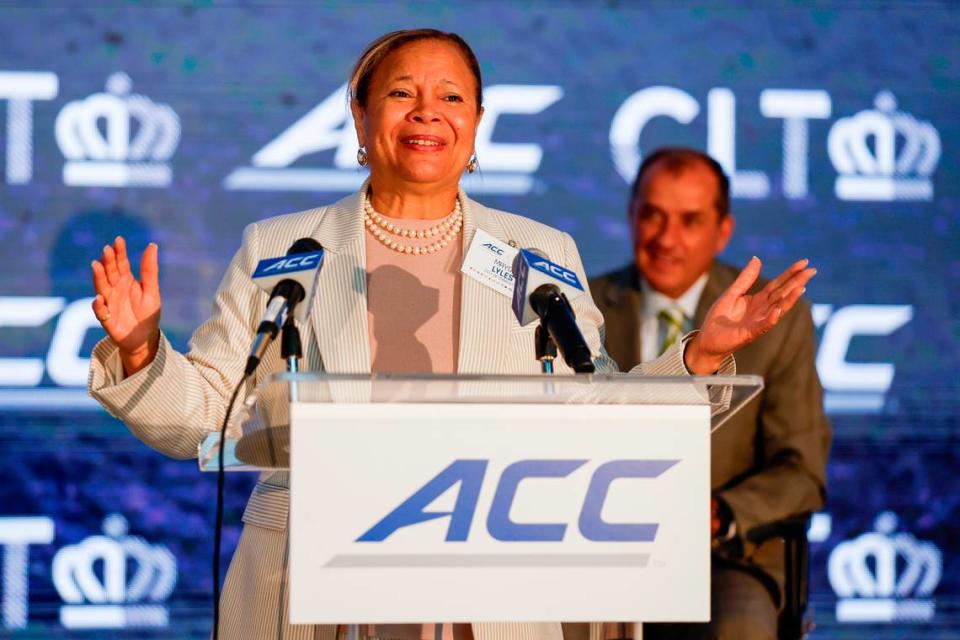ACC opens new headquarters in Charlotte. Will conference realignment force another move?
Miles away from Greensboro’s Sedgefield Country Club and in a brief respite from conference realignment, the ACC and Charlotte officials gathered Tuesday in uptown to officially mark the conference’s move to the Queen City.
Mayor Vi Lyles and Atlantic Coast Conference Commissioner Jim Phillips were among those on hand at the Legacy Union Complex at Bank of America Tower, 620 S. Tryon St., to celebrate the opening of the conference’s new headquarters after relocating to Charlotte from its original home in Greensboro.
The event culminated with flags representing the ACC’s 15 member schools and the city of Charlotte. Mascots from each school mimed fighting and dueled it out in cornhole, oversized Jenga and Connect Four. A DJ in the courtyard blared Kool & The Gang’s “Celebration,” ABBA’s “Dancing Queen” and a remix of Taylor Swift’s “Shake it Off.”
“This has been a journey over the last 18 months or so as we really tried to look at how we modernize the ACC, how we could get our forward-facing ACC brand in a different light across not only the region but across the country,” Phillps told the crowd at the ceremony.
But even with the conference settled in Charlotte for now, the ACC’s journey may not be over.
More changes coming for the ACC?

Conference realignment has been the story of the summer in college athletics. No schools have officially left or joined the ACC in recent months, with a “grant of rights” agreement largely locking schools in through 2036.
But that hasn’t kept the conference out of the headlines. And it says nothing about growing dissatisfaction among some schools still in the conference.
“My current assessment of the situation after very deep analysis is I believe FSU will have to at some point consider very seriously leaving the ACC unless there were a radical change to the revenue distribution,” FSU President Robert McCullough said at a board of trustees meeting in August.
Reports surfaced Monday that ACC presidents would meet to potentially vote on adding Stanford University, The University of California, Berkeley and Southern Methodist University to the conference. That meeting was postponed in the wake of the fatal shooting on the UNC Chapel Hill campus, The Athletic reported.
Phillips told a Charlotte Observer reporter Tuesday he had “no comment” on the Stanford, Cal and SMU rumors.
What does conference realignment mean for the ACC and Charlotte?
Phillips said he believes Charlotte, with its international airport and broad business and media landscape, is a strategic location for the ACC to call home — regardless of future changes.
“It’s a place to be able to attract, recruit and retain tremendous talent, a place where you can interface with Fortune 100 and 500 companies, to generate some additional revenue for your institutions,” he told The Observer. “... So all of that kind of fits together with the changing times in college sports and all the movement that you see now.”

Lyles called the ACC’s move to Charlotte an “amazing” moment for the city.
“The idea that we continue to build our sports platform and the ACC has chosen us shows that we can do this,” she said.
Asked about the potential impacts of changes to the ACC, Lyles told The Observer she “doesn’t have concerns because Charlotte is a very resilient community.”
“We will always seek out the best opportunities. And when people leave, we’ll try to give them that ability to know that we were grateful when they came, and go on and move forward,” she said. “As long as people are making progress, that’s what’s important.”
The move to Charlotte

Although the ACC’s Charlotte headquarters may be new, the conference’s ties to North Carolina date back to its founding.
It was in Greensboro, at the inn at the Sedgefield Country Club, in 1953 that Duke, North Carolina, N.C. State and Wake Forest joined three other schools — Clemson, Maryland and South Carolina — in leaving the Southern Conference to create the Atlantic Coast Conference.
For decades, the ACC continued to call Greensboro home as its membership ebbed and flowed. South Carolina and Maryland left, while Virginia, Georgia Tech, Florida State, Miami, Virginia Tech, Boston College, Syracuse, Pittsburgh and Louisville joined. Notre Dame is a member in all sports expect football.
“We were not without being mindful of the fact that we have been located in Greensboro for the last 70 years. This was not an easy decision for the board as we recognize the truly wonderful relationship we’ve had with Greensboro. But we are thrilled that we’re remaining in North Carolina,” Duke President Vincent Price, chairman of the conference’s board of directors, said when the move to Charlotte was announced in 2022.
Orlando, Florida, was among the other cities considered for the new ACC headquarters, The Observer reported previously.
North Carolina lawmakers agreed to give the ACC $15 million to remain in the state for the next 15 years, with a requirement that the ACC hold at least four men’s basketball tournaments, four women’s basketball tournaments and four baseball tournaments in the state within the next 10 years, in addition to any championships in North Carolina already on the conference’s schedule.
Charlotte has hosted a number of conference events, including the ACC football championship, 13 ACC men’s basketball tournaments and the 2021 and 2022 ACC baseball tournaments.

